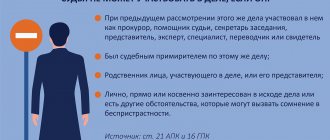ST 298.1 of the Criminal Code of the Russian Federation.
1. Defamation of a judge, juror or other person participating in the administration of justice in connection with the consideration of cases or materials in court -
shall be punishable by a fine in the amount of up to two million rubles, or in the amount of the wages or other income of the convicted person for a period of up to three years, or by compulsory labor for a term of up to three hundred and sixty hours.
2. The same act committed against a prosecutor, investigator, person conducting an inquiry, an employee of the compulsory enforcement authorities of the Russian Federation in connection with the conduct of a preliminary investigation or the execution of a sentence, court decision or other judicial act -
shall be punishable by a fine in the amount of up to one million rubles, or in the amount of the wages or other income of the convicted person for a period of up to two years, or by compulsory labor for a period of up to three hundred and twenty hours.
3. Acts provided for in parts one or two of this article, coupled with accusing a person of committing a grave or especially grave crime, -
shall be punishable by a fine in the amount of up to five million rubles, or in the amount of the wages or other income of the convicted person for a period of up to three years, or by compulsory labor for a term of up to four hundred eighty hours.
Commentary to Art. 298.1 of the Criminal Code
1. The victims are the same persons as in the crimes provided for in Art. 295 and 296 of the Criminal Code.
2. The objective side of the crime is expressed in the form of actions of slander: the dissemination of deliberately false information discrediting the honor and dignity of these persons, undermining their reputation and the authority of the judiciary. On the concept and signs of slander, see the commentary to Art. 128.1 of the Criminal Code of the Russian Federation. Slander must be public. The crime can be committed both in the courtroom (under Part 1), in the office premises of the indicated persons (Part 2), and outside it (in this case, the act must be related to the consideration of cases or materials in court or, accordingly, conducting a preliminary investigation or executing a sentence, court decision or other judicial act). These actions, combined with accusing a person of committing a grave or especially grave crime (Part 3), form a qualified crime.
3. The crime is recognized as completed from the moment of communication of slanderous information regarding these persons to at least one person, regardless of the occurrence of socially dangerous consequences.
4. The subjective side is characterized by direct intent and a special purpose to humiliate the honor and dignity of these persons, to undermine their reputation and the authority of the judiciary.
Second commentary to Art. 298.1 of the Criminal Code of the Russian Federation
1. Slander is expressed in actions related to the dissemination of information that is deliberately untrue, derogating the honor, dignity, and reputation of the persons specified in parts 1 and 2 of the commented article. Dissemination means communicating this information to at least one person.
2. Crimes are considered completed from the moment when the slanderous fabrications become known to at least one person.
3. The subjective side is characterized by direct intent. At the same time, according to Part 1 of Art. 298.1 the motive or purpose of the crime is the consideration of cases or materials in court, under Part 2 - the conduct of a preliminary investigation, the execution of a sentence, court decision or other judicial act.
4. The subject of crimes is a person who has reached the age of 16 years.
5. Defamation combined with accusing a person of committing a grave or especially grave crime is covered by Part 3 of Art. 298 CC. This type of slander must be distinguished from a deliberately false denunciation. When denunciating, information about an allegedly committed crime is, as a rule, reported to the authorities authorized to initiate criminal prosecution. In this case, the intent of the person is aimed at bringing the victim to criminal liability, and in case of slander, information is sent to other bodies, institutions and organizations with the aim of discrediting honor and dignity, and undermining the reputation of the slandered person.
Requiem for Article 298 of the Criminal Code of the Russian Federation
On December 7, 2011, Article 298 (defamation of a judge) disappeared from the Criminal Code of the Russian Federation. A day earlier, the Armed Forces of the Russian Federation finally found me not guilty of committing a crime under Part 3 of Art. 298 of the Criminal Code of the Russian Federation... on the 3240th day from the date of initiation of the case! In total, Article 298 and, accordingly, criminal punishment for libel against a judge and prosecutor lasted 5,819 days and nights. Come to think of it, for more than half of this period, I was subject to either an investigation or a trial, and then the prosecutor could not be worthy of apologizing for the same criminal case No. 630136, initiated on January 22, 2003 (No. 59-O11-25sp in the Armed Forces of the Russian Federation). Another, closely related to this, criminal case No. 724800 at the time of publication lasts 1695 days. I was convicted under it, and since decriminalization does not suit me, there is light at the end of the tunnel, but it is still far away - I dream that I will finally be acquitted and receive all the required compensation, meeting the expiration date of my favorite article.
As one of the most experienced and honest slanderers of Russia, I would like to say many kind words about this wonderful article. I am sure that the legislator was wrong to remove it from the Criminal Code! An article for defamation of a judge, investigator, prosecutor and bailiff could be the most effective measure to combat the subjects of criminal proceedings - investigators falsifying case materials, prosecutors covering them up, and judges making deliberately unjust decisions. Using the example of my own affairs, I will explain this in detail.
Remember, before Putin began to fight corruption, we, journalists, fought it. I'm sure we did it better. So, I killed governors, mayors and their deputies, prosecutors, and police chiefs. Many were removed, many were not voted for a second time. At one point, in my newspaper, I told how the chairman of the Amur regional court, Sergei Nikolaevich Semenov, burst into the office of the chairman of the Blagoveshchensk district court, Elena Viktorovna Sevastyanova, and, demanding that she make the decision he needed, insulted her both in word and action. And when Semenov called me at the editorial office and began to tell me that he would fire two judges anyway, I recorded his revelations and handed over the recording of the conversation to the prosecutor’s office and the Higher Qualification Committee. This was in 2000, when Putin just announced his “Mein Kampf” with corruption. Semenov was forgiven, but he was not to me.
I won’t go into deep details, but at one point my computer was seized, and legal proceedings began. At the end of this performance, when the court took it away from me and did not allow me to file a cassation appeal, I wrote a private complaint against another decision of the same judge on another theatrical performance. Again, I will not cite the entire complaint, limiting myself to those words that were subsequently used as the basis for the accusation for all 3240 days: “judges Kuzmina and Semyonov, having sided with the scammers, actually became scammers themselves.”
Even how this paper got to the prosecutor’s office is interesting: we all know that the papers go one way - to the judge, whose decision is being appealed, and this judge sends it to cassation. There is no other option, but not in my case! My paper did not go up, but sideways - to the chairman of the city court, Pavel Vladimirovich Belousov. And so Pasha handed over my private complaint to the prosecutor.
A criminal case was initiated under Part 1 of Art. 298 of the Criminal Code of the Russian Federation – slander against a judge. After the charges were brought, and after some time the case with an indictment signed by the regional prosecutor went to court. A retired judge from the Soviet school sat in court and she returned the case to the prosecutor to eliminate the shortcomings of the investigation due to the fact that slander is dissemination, and the fact of dissemination was not investigated by the investigation at all.
The prosecutor's office, in order not to waste their withered brains, closed the case for lack of corpus delicti. Everything is absolutely, simply incomparably correct! But there is, as they say, one nuance - the word fraudster, look in any dictionary, means one thing - a dishonest person. But, not otherwise, due to the inertia of prosecutorial thinking, they decided that the fraudster was a person convicted under Art. 159 of the Criminal Code of the Russian Federation – fraud. Once! During my interrogations, I did not refer to Article 51 of the Constitution and argued that the deputy chairman of the Blagoveshchensk City Court for Civil Cases made a deliberately unjust decision, which is a crime under Part 1 of Article 305 of the Criminal Code of the Russian Federation. Two! First, having opened a criminal case on the “fact” of slander, and then, stopping it due to the lack of corpus delicti, the prosecutor’s office de facto admitted that there was no slander in my words. And the antonym of slander is truth! That is, it was not me, the prosecutor’s office (read – the state), who admitted that judge Elena Viktorovna Kuzmina is a fraudster who committed a crime under Part 1 or 2 of Art. 159 of the Criminal Code of the Russian Federation and in relation to it there is a court verdict that has entered into legal force! How else? After all, only a court can recognize a person and even a judge as having committed fraud!
After I demanded that a case be opened against the investigator and that my property be returned to me, a new case was opened against me under Part 2 of Art. 297 of the Criminal Code of the Russian Federation (contempt of court). The article was stupid and remains so. There is no point in insulting a judge, and criminal insult can only be expressed in an indecent form; if you are innocent, why curse at the judge? The judge must hold a hearing according to the law and find that you are innocent! And if, on the contrary, he is guilty, then it is even more impossible to swear at the judge, because the judge can set an upper limit instead of a lower limit! Again, questions for the protocol, and what questions! —Your Honor, were you insulted in court? - Yes, terrible! - Please, repeat to us for the record all the words that the defendant brought down on your head, just remember everything, we must write down and send for examination what is decent and what is not... - ...... - Great, we all recorded... Oh, sorry, Your Honor, but the defendant’s lawyer demands to see the transcript of the court hearing as evidence, he says that these wonderful words are not displayed there. - ..... - Oh, do you have an audio recording? Wonderful!.. Oh, sorry, Your Honor, but the lawyer says that you refused to include the audio recording of the trial as evidence in the defendant’s case file... so why the hell did you, a fool in a robe, come to my court?! Fuck you!.. And quietly: secretary, don’t write down my words - this is contrary to the rules of keeping minutes of a court hearing. But this is lyrics, albeit through logic. Be that as it may, on charges of committing a crime under Part 2 of Art. 297 of the Criminal Code of the Russian Federation, the criminal case was dismissed for lack of corpus delicti.
Further - funnier. I have a new civil case in which the ears of the same regional court chairman Semenov are sticking out. Instead of a legal consideration of this case within a month, it is considered within a year by four judges of the city court and 16 regional ones. Knowing already after the first illegal decision of the current chairman of the council of judges of the region, Oleg Dorzhievich Vasiliev, that I would not achieve Justice in my native region, I challenged the then chairman of the Amur Region Court of Justice Konstantin Stepanovich Blagov, and then the chairman of the court Pavel Vladimirovich Belousov and all the judges in cassation due to the fact that the state recognized Kuzmina as a fraudster, and I don’t understand suing in a court ruled by criminals.
After the chairman of the regional court, Sergei Semyonov, stated in writing that his daughter had never worked as a lawyer in the editorial office from which I was fired during my stay on a business trip abroad, I began to call him a complete lying scum, and the chairman of the council of judges, Belousov, as Semyonov’s slave and a rat lawyer. , in connection with which he asked to change the jurisdiction of the civil case outside the Semyonovsky court. And here's an honest one - he wrote a confession on himself and attached it to the challenge. However, neither the jurisdiction was changed nor a case was opened against me. And I demanded it! First from the city prosecutor, then the region, and... when Mr. Chief Judge realized that I would then appeal the refusal to the Prosecutor General... the deputy chairman of the Blagoveshchensk City Court, after a whole year, suddenly found out that in the written challenges filed to the court, I had cruelly slandered her!
A new criminal case was immediately opened against me! At the same time, no one was at all interested in who exactly allowed the “spread” of my possibly slanderous fabrications. The challenges were written, although they were also stated orally; no one except the judge and the participants in the proceedings had access to the cases; the public was not present during the proceedings. How did Kuzmina find out a year later what was written in the materials of the case filed in the archives? I don’t know, but I admit that the investigation, the prosecutor’s office, and then the judge, the current chairman of the regional KKS, Alexander Vasilyevich Pershin, came to the correct conclusion about the greatest insight of the Russian judge as such, and I was sentenced to two years probation. Don't you like the axiom about the greatest insight of the Russian judge?! In vain! Only a Russian judge, unlike his colleagues from the countries of the “golden billion,” is so perspicacious that he knows enough about the guilt or guilt of a person before the start of the judicial investigation. Only ours knows how wrong eyewitnesses can be, and each of you has probably encountered this more than once. I’ll tell you more about the mechanism of this case. But for now it’s no less interesting.
A case was opened against me under Part 1 of Art. 298 of the Criminal Code of the Russian Federation secretly, I found out about it a month later, two days before a new trip to China. He did not give a written undertaking not to leave the place, did not hide from the investigation, and upon returning, immediately presented himself for questioning, but after a couple of days he ended up in a pre-trial detention center. By the way, it is to him that I owe the SIZU systemic knowledge of the criminal procedural legislation of Russia and a non-systematic approach to it. To close this case, I went to court with a demand that the prosecutor, on the basis of Article 136 of the Code of Criminal Procedure of the Russian Federation, apologize to me for the illegal criminal prosecution in an already stinking case with the same “patient”. Have you ever seen a prosecutor who follows the Law exactly? So I don’t! The prosecutor did not want to apologize and close the new case, so for the third time, already under Part 3 of Art. 298 of the Criminal Code of the Russian Federation has revived the old. But I also had to tinker with the new one - I stated that I did not give a subscription, therefore I could not violate it, and the Law does not allow putting a person in prison on suspicion of committing a crime of lesser gravity. What should a poor prosecutor do in such conditions? It’s right to overexcite the case so as to drive it into the Procrustean bed of the law. So in the new case I was convicted under Part 3 of Art. 298 of the Criminal Code of the Russian Federation. But the problem remained - I was overexcited and the old one! The investigator offered to close it for any non-rehabilitating circumstance, secretly covered it up due to the statute of limitations, but I, presumably, out of my natural callousness did not agree - relying on the Supreme Court in a “new” case, I agreed to be considered by the judge alone and now I had to win both.
On June 8, 2011, the jury returned a verdict of not guilty, and, as I said, on December 6 last year, the Supreme Court upheld the acquittal.
I have always said that Russian laws are logical and, for the most part, fair. The investigation, the prosecutor's office and the court for this third time accused me of slandering Judge Kuzmina by accusing her of committing a crime under the last parts of Article 159, that is, of fraud on an especially large scale, using her official position, by a group of persons with prior consent. collusion. I argued in court that she made a deliberately unjust decision in order to impede the legitimate professional activity of a journalist, made a deliberately false denunciation and gave deliberately false testimony, having such a wish from Chairman Semenov and acting together with other judges - that is, I also accused her of committing crimes provided for in Articles 144, 305-307 of the Criminal Code of the Russian Federation. The court, first consisting of a presiding judge and 12 jurors, and then consisting of three more judges of the Supreme Court, did not find any slander at all, did not refer to the case of Kabanov against the Russian Federation, and did not know that slander had been removed from the Criminal Code.
Conclusion: The Russian Federation, represented by the Investigative Committee, the Prosecutor General's Office and the Supreme Court of the Russian Federation, admitted that the deputy chairman of the Blagoveshchensk City Court, a judge of the second qualification class, Elena Viktorovna Kuzmina, is a fraudster, i.e. dangerous thief on trust. The court de jure established that somewhere in the foreseeable past she was convicted under parts 3.4 of Art. 159 of the Criminal Code of the Russian Federation and somehow is still considered to be convicted under this wonderful article! Logical?
Now let's get back to our topic. Article 298 of the Criminal Code of the Russian Federation is the best means of combating the arbitrariness of our judicial system! Only the European Court did not consider the case of Kabanov against Russia on time, and the legislator completely mediocrely disposed of the advice that came to him from Strasbourg.
We must understand the main thing.
Article 297 (contempt of court) should be removed from the Criminal Code for now.
According to the current Criminal Code and Criminal Procedure Code, a judge or prosecutor cannot be insulted with words! This contradicts Part 1 of Art. 5 of the Criminal Code – the principle of guilt. It is impossible to establish guilt based on insult until the law requires that a video recording of the process be preserved in the criminal case file. Well, since all the defendants and their defenders constantly insist on this, prosecutors and judges will strongly oppose such a legislative initiative.
But when the mandatory video recording of the process is included in the Criminal Procedure Code along with the protocol of the court session, Article 297 must be urgently returned to the Criminal Code, but significantly expanded! Not only insulting the participants in the process is a manifestation of contempt of court. Not only can the defendant or his defense attorney show disrespect expressed in insulting the judge or juror (Part 2 of Article 297), but the judge can also show contempt of the court by removing the defendant from the trial for allegedly violating the rules, when there was no such violation . And the judge can show contempt of court when he says that the witness is not telling the truth without any reason. You never know how a judge can show disrespect for the court?! I saw judges whose level of education, not “education,” corresponded to the third grade of a school for downs, but who demanded that they be treated with respect if you pointed out to such a “genius” of jurisprudence in unfamiliar words a flagrant violation of the Law. How many of you remember that at least one judge in a trial understood that it was not him at all!
“Their Honors” does not realize that if the law requires you to stand up when the presiding officer enters with the words of the secretary, “Stand up, the trial is coming!”, then this is not because the court is the judge, but because with the arrival of the Presiding Officer, the Court gathers in in full force. In the hall of the courthouse sat the Respected Parties - the Respected, not yet recognized as guilty, the Defendant and his Defender on one Side and the Respected, not yet recognized as such, the Victim with his Defender, as well as the Defender of State Interests, the Respected State Prosecutor, that is, the Prosecutor, on the other. In the same hall of the same building sat the Dear Secretary. And only when, finally, the one who would preside in this highly intellectual shalman appeared, and the Dear Secretary cried out loudly about this, only then did the Court meet in full, and the hall in the building, occupied by the court, became the Courtroom.
If now some defendant insulted the judge, the judge will easily set the upper limit for him and there is no need to enter any obscenities into the protocol, and the Criminal Code is not filled with unnecessary letters.
On the contrary, Article 298 of the Criminal Code of the Russian Federation needs to be returned to the Code urgently!
Example. The suspect, while in the temporary detention facility, ends up in the press hut and is “convinced” to write a “confession.” The lawyer, appearing after this, asks why he is such an idiot and he tells what’s what. After that, in the presence of a lawyer, he describes all this in his own hand, relatives or well-wishers get into the hands of this paper, they post it in the press or on the Internet, and the defendant writes a confession - I have “slandered” the investigation! A new case should immediately be opened against our defendant, and the investigator, naturally, should be removed from work on the case, since he has a clear interest. If our defendant lied, he will get a couple of years added. But if not, such cases must necessarily go to court and such an applicant must present himself as a victim. Well, after the trial, which acquits our client, a case should be immediately opened against the investigator on charges of crimes provided for, depending on what our suspect said, even if for some episodes he was found guilty, under Articles 299-304.
Well, with slander against a judge it’s clear and even more so! If I did not slander, then I told the truth and Article 305 should be applied to the judge immediately, without any appeals from the Chairman of the RF IC to the Qualification Board - the court has ALREADY established that the former defendant did not lie! Any other option contradicts the constitutional principle of equality of all before the Law and the Court!
You say that they, the judges, will come up with something so that they still remain covered in chocolate and not some other substance of a similar color? And I agree with you! But here we need the will of a weak-willed legislator and the fear of being left out of work, which plagues the current president-lawyer and the second “genius of practical jurisprudence” who is striving to return to the chair of the guarantor.
All crimes against Justice must return to the standard of punishment that existed in the Criminal Code of the RSFSR - from three to ten years and without any “suspended” terms. And in order to ensure that there is no opportunity at all to shuffle the deck, to choose “scapegoats” and those “who slightly stumbled,” all cases of crimes against Justice should be investigated by randomly selected investigators (by the unscientific poking method, by pulling tickets from a rotating drum in front of the cameras and media blitzes) from regions of the country remote from where the act was committed. All cases must necessarily go to court, with the possibility in court to apply the more serious part or article of Chapter 31. And the defendant, under any article of Chapter 31 of the Criminal Code, must have a choice of only two roads - either admitting guilt and going to a professional court in another region for a minimum sentence, or not admitting guilt and a trial with the participation of a jury, but still in something else, sufficient remote region.
Naturally, in contrast to my example, both the court and the investigation must consider all the arguments of the accused of slander on the merits - study materials and evidence in a criminal or civil case, and do not order consideration of verdicts or court decisions that have entered into legal force in any arbitration body. those who cancel them, and those who give a picture of whether the slanderer is right or not. There must be, from end to end, at least some sense will appear from all these television shows “about getting up, the trial is coming”!
Yes, if Article 298 is returned to the Criminal Code and through the legislator and the president-lawyers explain how important it is for Justice, which does not need epithets, many investigators, prosecutors and “their honors” will go to prison seriously and for a long time. But how else can we clean out the Augean stables of Russian crooked justice?!
As for me, I am now ready to take on both of my criminal cases with the possibility, if I lose in court, of being imprisoned for either 10 or 20 years, but, excuse me, I wish my “patients” a Fair Trial and fair retribution , if I am acquitted again!






